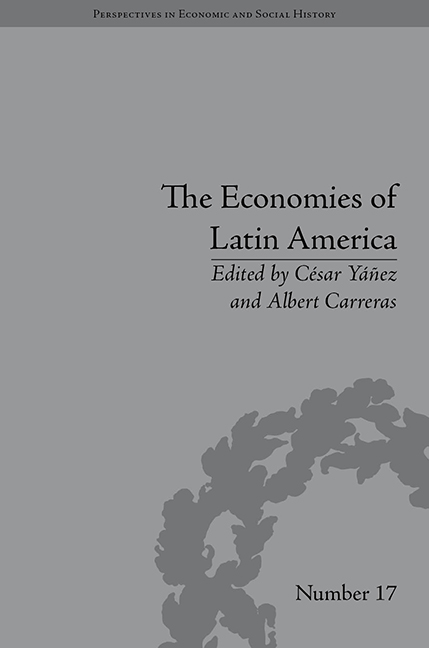Book contents
- Frontmatter
- CONTENTS
- List of Figures and Tables
- List of Contributors
- Preface
- Introduction: Latin American Economic Backwardness Revisited
- 1 Expectations, Institutions and Economic Performance: Latin America and the Western European Periphery during the Twentieth Century
- 2 On the Accuracy of Latin American Trade Statistics: A Non-Parametric Test for 1925
- 3 Latin America and Its Main Trade Partners, 1860–1930: Did the First World War Affect Geographical Patterns?
- 4 The Structure of Latin American Investment in Equipment Goods during the Mature Period of the First Globalization
- 5 Factorial Distribution of Income in Latin America, 1950–2000: New Series from the National Account Data
- 6 The Influence of the First World War on the Economies of Central America, 1900–29: An Analysis From a Foreign Trade Perspective
- 7 Economic Modernization in Adverse Institutional Environments: The Cases of Cuba and Chile
- 8 Capital Goods Imports, Machinery Investment and Economic Development in the Long Run: The Case of Chile
- 9 The Sugar Industry, the Forests and the Cuban Energy Transition, from the Eighteenth Century to the Mid-Twentieth Century
- 10 Empirical Debate on Terms Of Trade and the Double Factorial Terms of Trade of Colombia, 1975–2006
- 11 Public Revenues in Bolivia, 1900–31
- 12 The Consumption of Durable Goods in Latin America, 1890–1913: Analysis and Estimation of a Demand Function
- Notes
- Index
Introduction: Latin American Economic Backwardness Revisited
- Frontmatter
- CONTENTS
- List of Figures and Tables
- List of Contributors
- Preface
- Introduction: Latin American Economic Backwardness Revisited
- 1 Expectations, Institutions and Economic Performance: Latin America and the Western European Periphery during the Twentieth Century
- 2 On the Accuracy of Latin American Trade Statistics: A Non-Parametric Test for 1925
- 3 Latin America and Its Main Trade Partners, 1860–1930: Did the First World War Affect Geographical Patterns?
- 4 The Structure of Latin American Investment in Equipment Goods during the Mature Period of the First Globalization
- 5 Factorial Distribution of Income in Latin America, 1950–2000: New Series from the National Account Data
- 6 The Influence of the First World War on the Economies of Central America, 1900–29: An Analysis From a Foreign Trade Perspective
- 7 Economic Modernization in Adverse Institutional Environments: The Cases of Cuba and Chile
- 8 Capital Goods Imports, Machinery Investment and Economic Development in the Long Run: The Case of Chile
- 9 The Sugar Industry, the Forests and the Cuban Energy Transition, from the Eighteenth Century to the Mid-Twentieth Century
- 10 Empirical Debate on Terms Of Trade and the Double Factorial Terms of Trade of Colombia, 1975–2006
- 11 Public Revenues in Bolivia, 1900–31
- 12 The Consumption of Durable Goods in Latin America, 1890–1913: Analysis and Estimation of a Demand Function
- Notes
- Index
Summary
Introduction
Prior research into Latin American economic growth was undertaken mainly by Luis Bértola and José Antonio Ocampo, using Angus Maddison's GDP per capita data in the OECD data base. These authors focused primarily on the estimation of periods of convergence and divergence in relation to the leader countries. Our book revisits the subject, making use of the same data, but focusing on the magnitude of economic backwardness in order to highlight the degree of difficulty Latin American countries face when attempting to move beyond their current level of development. This research does not aim to question the value of the convergence criterion. On the contrary, it values the accumulation of historiographical knowledge and looks carefully at Maddison's research data. It is surprising to note that in 2008 Haiti's GDP per capita was US$686 at purchasing power parity (PPP), which is less than that estimated for all the countries in that region for 1820 (US$691 at PPP). This is not too different from Leandro Prados de la Escosura's proposal of US$649 for the same year. This would indicate that the poorest part of Latin America (represented by Haiti) has the same level of wealth as Latin American countries had at the time of independence, roughly 200 years ago. Among the leader economies, the United Kingdom had a similar figure of US$761 at PPP in 1500, five centuries ago. Haiti however, is most certainly not representative of the whole of Latin America.
- Type
- Chapter
- Information
- The Economies of Latin AmericaNew Cliometric Data, pp. 7 - 18Publisher: Pickering & ChattoFirst published in: 2014



